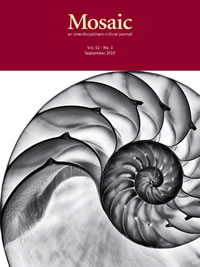Issue 52.3
Overview

General Issue
Published: September 2019
View the issue introduction or see the issue summary and contents below.
10 essays, totalling 200 pages
$24.95 CAD
This general issue features essays on the diurnal course of the lyric, hallucinogenic regression, landscape gardening, African speculative fiction, theories of reading, Canada’s Parliament buildings, and the Japanese Canadian experience.
Lyric’s Diurnal Course: Reading with GeologyJeremy Davies This essay extends the “geologic turn” in the humanities to consider the diurnal, monthly, and annual cycles through which we experience Earth’s mobility with respect to other astronomical objects. I trace relationships between geological time and lyric temporality via a reading of Byron’s “So We’ll Go No More A Roving.” | |
Hallucinogenic Ecology and Psychoanalytic Prehistory in Margaret AtwoodAlexander Menrisky Amidst a resurgence in the popularity of plant hallucinogens, Margaret Atwood’s MaddAddam trilogy foregrounds the historical association between organic drugs and ecological consciousness. This essay examines how Atwood dramatizes and critiques psychoanalytic narratives that have contributed to this connection since midcentury as ultimately nihilistic expressions of romantic primitivism. | |
Changing Chinese Ideas into a Native English Tradition: The Complex Consequences of Horace Walpole’s Horticultural NationalismYu Liu Horace Walpole has long been known for his nationalistic repudiation of Chinese landscaping. By scrutinizing the discrepancy between his rhetoric and actions, this essay strives to cast a new light on the complex English reception and acceptance of Chinese gardening ideas in the eighteenth century. | |
Ab-ruption: Towards a Poetics in Gustaf Sobin’s Early WorkD.M. Spitzer This essay unfolds a poetics of ab-ruption in Gustaf Sobin’s Wind Chrysalid’s Rattle (1980) and Celebration of the Sound Through (1982). Ab-ruption registers both in the language and graphically. In progressively radical ways the poetry produces openings through which non-being and a non-lingual region become visible. | |
Against Surface Reading: Just Literality and the Politics of ReadingBruno Penteado Best and Marcus’s surface reading urges scholars to embrace descriptive reading practices. I argue that they misread both de Man when claiming that texts need no readerly intervention and Jameson in their account of symptomatic reading. I also take issue with their claim that we are post-ideological. | |
Poem, Creed, Letter, Foetus: George Orwell’s Keep the Aspidistra FlyingMartha C. Carpentier A Lacanian reading of George Orwell’s Keep the Aspidistra Flying underscores the mordant vision of this 1936 novel, explicating the impact on consciousness, gender, and sexuality of multiple sign systems under capitalism, the failure of poetry to reinvigorate the signifier, and Orwell’s critique of the ideological interpellation of the subject. | |
‘Isn’t Realist Fiction Enough?’: On African Speculative FictionJoshua Yu Burnett Using a question posed by Chimamanda Ngozi Adichie as a launching point, this essay asks whether speculative fiction has value to African and African diasporic Literature, and uses the novella Binti by Nnedi Okorafor and the short story “Branded” by Lauren Beukes to explore the issue. | |
Parliamentary Gothic: The Art of History in Canada’s Parliament BuildingsLaurel Ryan The art and architecture of Canada’s Parliament Buildings form a set of living narratives about political power. The Gothic Revival exterior privileges a story of Anglo-European dominance, but inside, that story is slowly changing to reflect a more inclusive vision of the nation. | |
East or West—Home is Best: Translating the Yugoslav Household into EnglishLjiljana Marković, Biljana Đorić Francuski, and Andrea Stojilkov Yugoslav culture was an amalgam of opposing traditions—Western and Eastern, urban and rural, bourgeois and communist. This essay identifies challenging references to domestic culture in a selection of post-Yugoslav novels set in socialist Yugoslavia and analyzes the felicity and diversity of strategies and methods employed in their English translations. | |
Repositioning the Narrative of the Japanese Canadian Internment through Multidirectional MemoryPetra Fachinger This essay examines how Kerri Sakamoto’s One Hundred Million Hearts (2003), Kyo Maclear’s The Letter Opener (2007), and Ruth Ozeki’s A Tale for the Time Being (2013) engage in the kind of multidirectional memory that Michael Rothberg promotes by making connections between the Japanese Canadian internment and other collective and individual traumas. By drawing attention to human rights issues elsewhere in the world, these narratives open new perspectives on the memories of the internment and suggest opportunities for global solidarity. |